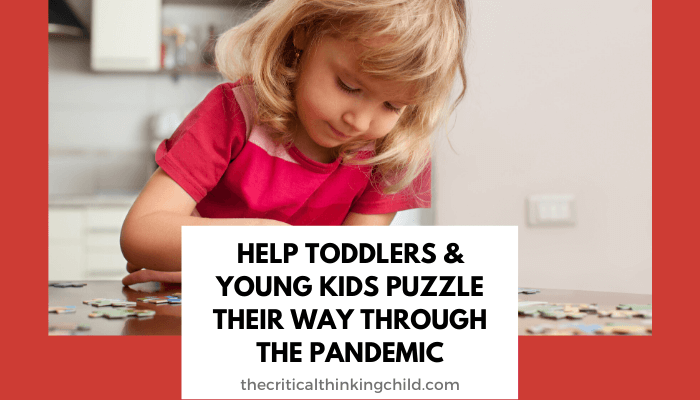Puzzles are having a moment. In fact, puzzle sales at Ravensburger, one of the leading puzzle companies, have increased dramatically since the onset of the pandemic and distance learning.
Not only are puzzles fun for kids and adults alike, but they also have a ton of valuable educational benefits, such as improving critical thinking for kids. If you can find a puzzle during the pandemic, here’s what parents with toddlers and young kids need to know:
Puzzling provide great bonding time for your kids during distance learning
Working as a family to complete a task can be really satisfying. Because you’re not plugged into a screen for distance learning, it’s a great time to chat and spend time together as a family.
To maximize puzzling as a bonding experience, let your kids pick out the puzzle design to make sure it’s interesting to them, and let them lead the way as you work on it. There are even some websites that allow you to upload your own photo and have it turned into a puzzle, so using a family photo is a great way to build engagement. Some people even like to glue the finished puzzle to make wall art for their homes!
Puzzles keep kids busy when you need to work
On the flip side, puzzles can also be a great babysitter when you need to get some work done. Puzzles don’t make noise or use your internet bandwidth, so you can stay on track in your professional meetings while your kids stay focused on puzzles. This is a great way to encourage independent learning.
Puzzles are also immersive, with many children spending hours working on them without even noticing. Your child is unlikely to interrupt you needing help. Puzzles also provide a great break from distance learning. They have great benefits for critical thinking for kids and also give your kids a break from worksheets or Zoom lessons.
Puzzles build spatial vocabulary
When you’re working on a puzzle with your kids, talk as much as you can! While you want to avoid doing the puzzle for them, you can give clues. If you’re puzzling with a very young child, you can offer color clues like “try the red piece!” or shape clues “try the square!” As children grow older, you can progress to more complex clues like “try flipping that piece” or “find the corner piece.”
This type of talk lets your child do the actual work and gain the confidence that comes from completing tasks one their own, but you’re building spatial vocabulary in the process.
Puzzles improve spatial thinking and reasoning
In addition to improving spatial vocabulary, puzzles are also a great way to improve critical thinking for kids; they have been shown to improve spatial thinking and reasoning, even in very young children. A 2012 study from the University of Chicago showed that kids who played with puzzles at home were more successful on mental transformation spatial tasks. This means that kids who puzzle from an early age have better spatial thinking than those who do not.
Spatial thinking is a hugely important skill moving into adulthood; we use spatial thinking all the time to read maps, fit leftovers into the correct containers, and find spaces for furniture in our homes!
Help your child puzzle their way to success
No matter your reason for puzzling through this pandemic and times of distance learning, working on puzzles with your kids offers endless benefits for you and your child!
Be sure to check out our various puzzles and workbooks that focus on spatial learning — so you can get the most out of your time!
Sources used:



